NURSING 7: Reflection on Personal Cultural Values in Healthcare
VerifiedAdded on 2021/04/17
|7
|1374
|70
Report
AI Summary
This report, prepared for NURSING 7, delves into the intricate relationship between personal cultural values, beliefs, and behaviors and their influence on healthcare practices. The assignment begins with the construction of a mind map that visually represents the author's personal cultural identity, highlighting values such as integrity, discipline, and accountability. The report then transitions into a reflective analysis, examining how these values contribute to or detract from being a culturally safe practitioner within a multicultural healthcare environment. It emphasizes the importance of self-awareness, the adoption of professional values, and the ethical considerations essential for providing quality care that respects the diverse needs of patients. The reflection also addresses the development of attributes and areas requiring further growth to enhance cultural competency in nursing practice, drawing upon relevant literature to support its arguments and insights.
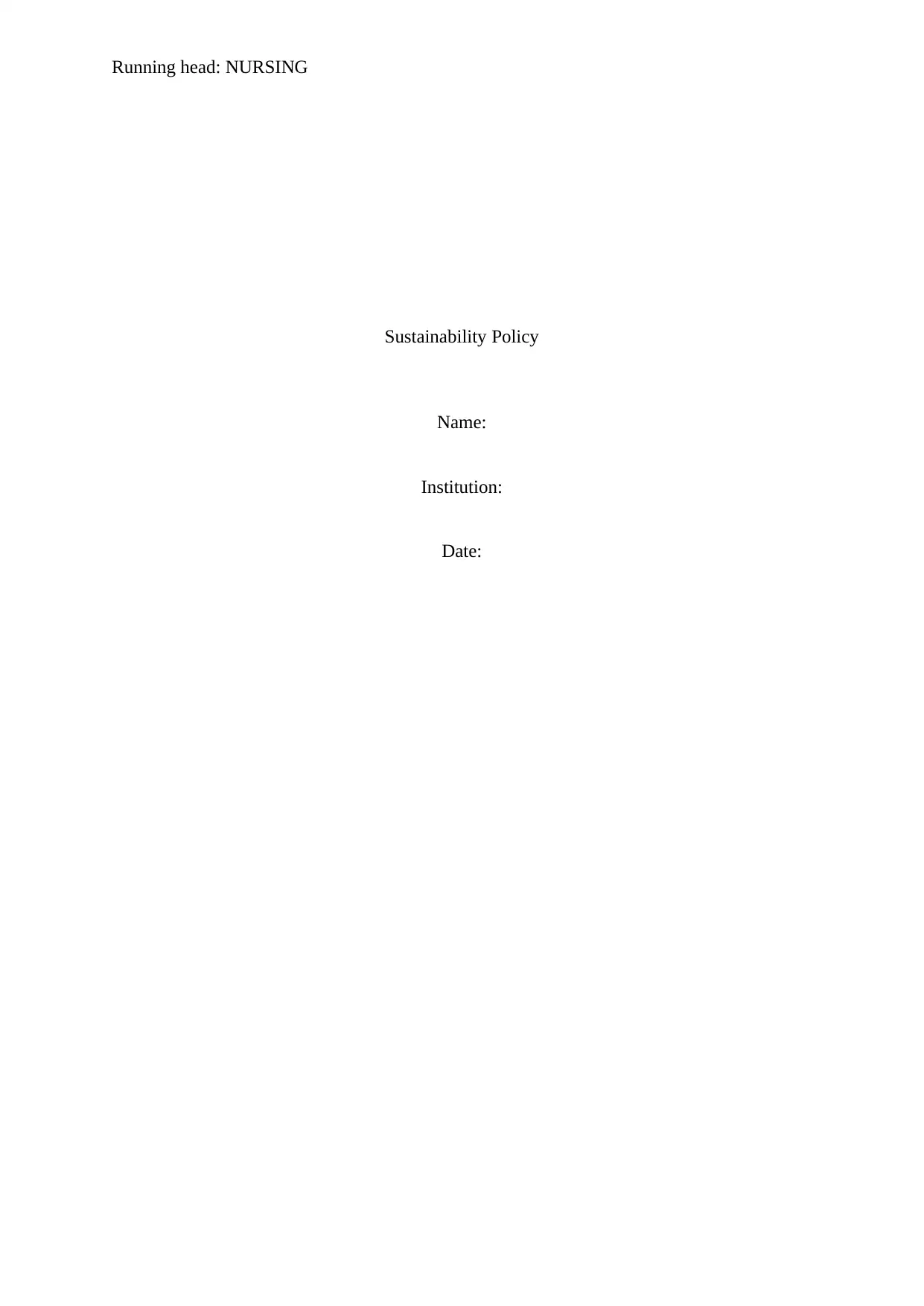
Running head: NURSING
Sustainability Policy
Name:
Institution:
Date:
Sustainability Policy
Name:
Institution:
Date:
Paraphrase This Document
Need a fresh take? Get an instant paraphrase of this document with our AI Paraphraser
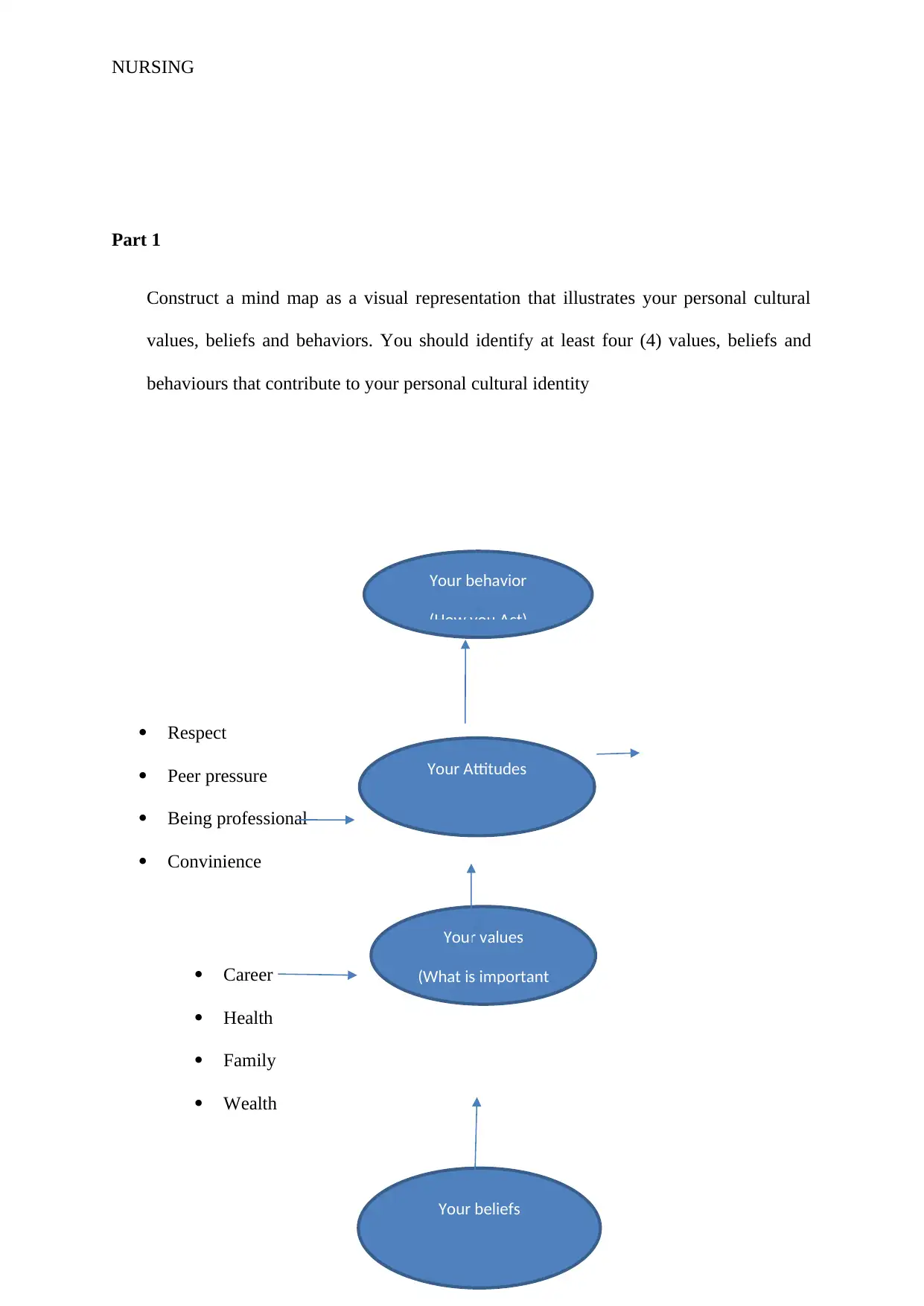
NURSING
Part 1
Construct a mind map as a visual representation that illustrates your personal cultural
values, beliefs and behaviors. You should identify at least four (4) values, beliefs and
behaviours that contribute to your personal cultural identity
Respect
Peer pressure
Being professional
Convinience
Career
Health
Family
Wealth
Your behavior
(How you Act)
Your Attitudes
Your values
(What is important
Your beliefs
Part 1
Construct a mind map as a visual representation that illustrates your personal cultural
values, beliefs and behaviors. You should identify at least four (4) values, beliefs and
behaviours that contribute to your personal cultural identity
Respect
Peer pressure
Being professional
Convinience
Career
Health
Family
Wealth
Your behavior
(How you Act)
Your Attitudes
Your values
(What is important
Your beliefs
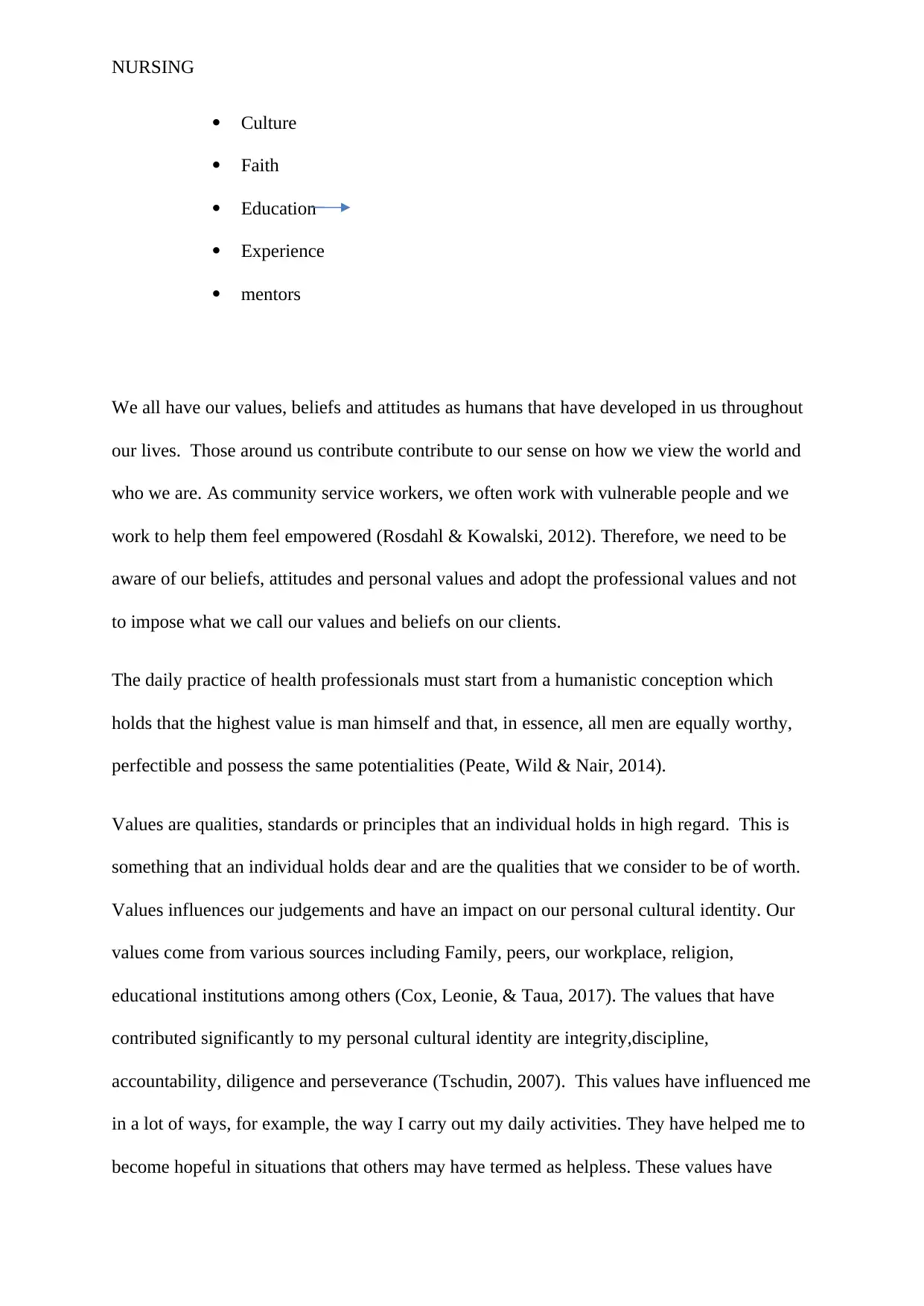
NURSING
Culture
Faith
Education
Experience
mentors
We all have our values, beliefs and attitudes as humans that have developed in us throughout
our lives. Those around us contribute contribute to our sense on how we view the world and
who we are. As community service workers, we often work with vulnerable people and we
work to help them feel empowered (Rosdahl & Kowalski, 2012). Therefore, we need to be
aware of our beliefs, attitudes and personal values and adopt the professional values and not
to impose what we call our values and beliefs on our clients.
The daily practice of health professionals must start from a humanistic conception which
holds that the highest value is man himself and that, in essence, all men are equally worthy,
perfectible and possess the same potentialities (Peate, Wild & Nair, 2014).
Values are qualities, standards or principles that an individual holds in high regard. This is
something that an individual holds dear and are the qualities that we consider to be of worth.
Values influences our judgements and have an impact on our personal cultural identity. Our
values come from various sources including Family, peers, our workplace, religion,
educational institutions among others (Cox, Leonie, & Taua, 2017). The values that have
contributed significantly to my personal cultural identity are integrity,discipline,
accountability, diligence and perseverance (Tschudin, 2007). This values have influenced me
in a lot of ways, for example, the way I carry out my daily activities. They have helped me to
become hopeful in situations that others may have termed as helpless. These values have
Culture
Faith
Education
Experience
mentors
We all have our values, beliefs and attitudes as humans that have developed in us throughout
our lives. Those around us contribute contribute to our sense on how we view the world and
who we are. As community service workers, we often work with vulnerable people and we
work to help them feel empowered (Rosdahl & Kowalski, 2012). Therefore, we need to be
aware of our beliefs, attitudes and personal values and adopt the professional values and not
to impose what we call our values and beliefs on our clients.
The daily practice of health professionals must start from a humanistic conception which
holds that the highest value is man himself and that, in essence, all men are equally worthy,
perfectible and possess the same potentialities (Peate, Wild & Nair, 2014).
Values are qualities, standards or principles that an individual holds in high regard. This is
something that an individual holds dear and are the qualities that we consider to be of worth.
Values influences our judgements and have an impact on our personal cultural identity. Our
values come from various sources including Family, peers, our workplace, religion,
educational institutions among others (Cox, Leonie, & Taua, 2017). The values that have
contributed significantly to my personal cultural identity are integrity,discipline,
accountability, diligence and perseverance (Tschudin, 2007). This values have influenced me
in a lot of ways, for example, the way I carry out my daily activities. They have helped me to
become hopeful in situations that others may have termed as helpless. These values have
⊘ This is a preview!⊘
Do you want full access?
Subscribe today to unlock all pages.

Trusted by 1+ million students worldwide
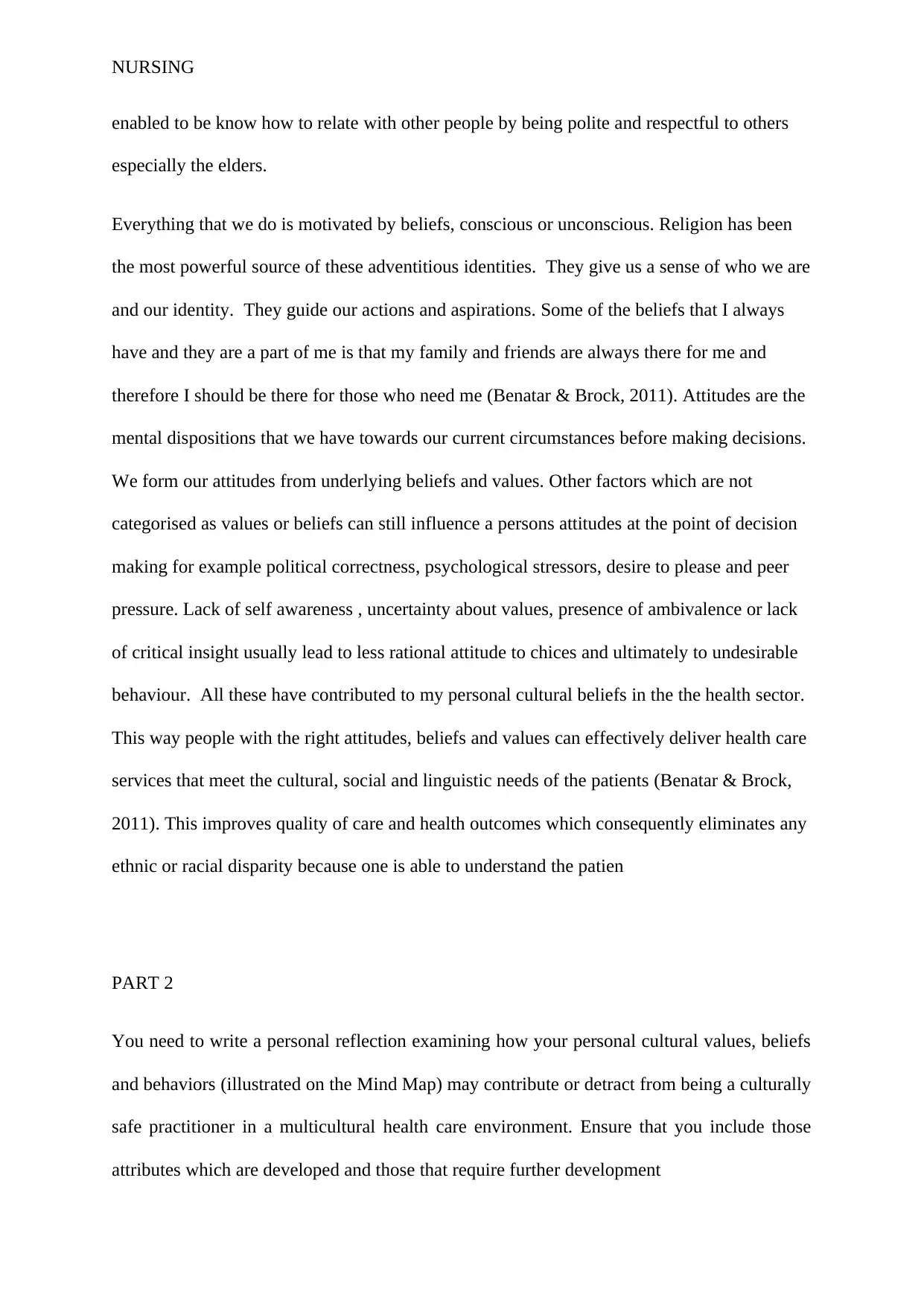
NURSING
enabled to be know how to relate with other people by being polite and respectful to others
especially the elders.
Everything that we do is motivated by beliefs, conscious or unconscious. Religion has been
the most powerful source of these adventitious identities. They give us a sense of who we are
and our identity. They guide our actions and aspirations. Some of the beliefs that I always
have and they are a part of me is that my family and friends are always there for me and
therefore I should be there for those who need me (Benatar & Brock, 2011). Attitudes are the
mental dispositions that we have towards our current circumstances before making decisions.
We form our attitudes from underlying beliefs and values. Other factors which are not
categorised as values or beliefs can still influence a persons attitudes at the point of decision
making for example political correctness, psychological stressors, desire to please and peer
pressure. Lack of self awareness , uncertainty about values, presence of ambivalence or lack
of critical insight usually lead to less rational attitude to chices and ultimately to undesirable
behaviour. All these have contributed to my personal cultural beliefs in the the health sector.
This way people with the right attitudes, beliefs and values can effectively deliver health care
services that meet the cultural, social and linguistic needs of the patients (Benatar & Brock,
2011). This improves quality of care and health outcomes which consequently eliminates any
ethnic or racial disparity because one is able to understand the patien
PART 2
You need to write a personal reflection examining how your personal cultural values, beliefs
and behaviors (illustrated on the Mind Map) may contribute or detract from being a culturally
safe practitioner in a multicultural health care environment. Ensure that you include those
attributes which are developed and those that require further development
enabled to be know how to relate with other people by being polite and respectful to others
especially the elders.
Everything that we do is motivated by beliefs, conscious or unconscious. Religion has been
the most powerful source of these adventitious identities. They give us a sense of who we are
and our identity. They guide our actions and aspirations. Some of the beliefs that I always
have and they are a part of me is that my family and friends are always there for me and
therefore I should be there for those who need me (Benatar & Brock, 2011). Attitudes are the
mental dispositions that we have towards our current circumstances before making decisions.
We form our attitudes from underlying beliefs and values. Other factors which are not
categorised as values or beliefs can still influence a persons attitudes at the point of decision
making for example political correctness, psychological stressors, desire to please and peer
pressure. Lack of self awareness , uncertainty about values, presence of ambivalence or lack
of critical insight usually lead to less rational attitude to chices and ultimately to undesirable
behaviour. All these have contributed to my personal cultural beliefs in the the health sector.
This way people with the right attitudes, beliefs and values can effectively deliver health care
services that meet the cultural, social and linguistic needs of the patients (Benatar & Brock,
2011). This improves quality of care and health outcomes which consequently eliminates any
ethnic or racial disparity because one is able to understand the patien
PART 2
You need to write a personal reflection examining how your personal cultural values, beliefs
and behaviors (illustrated on the Mind Map) may contribute or detract from being a culturally
safe practitioner in a multicultural health care environment. Ensure that you include those
attributes which are developed and those that require further development
Paraphrase This Document
Need a fresh take? Get an instant paraphrase of this document with our AI Paraphraser
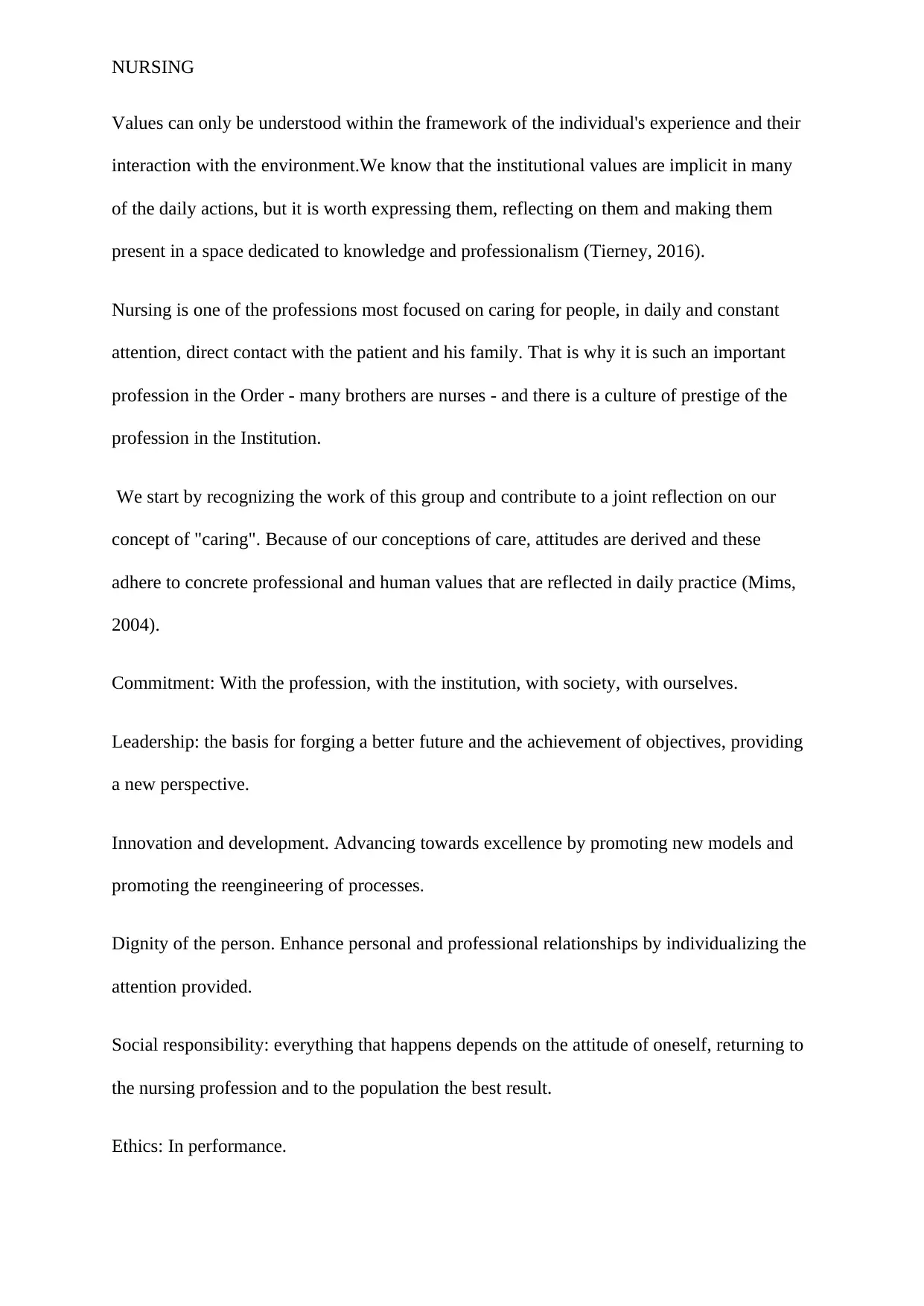
NURSING
Values can only be understood within the framework of the individual's experience and their
interaction with the environment.We know that the institutional values are implicit in many
of the daily actions, but it is worth expressing them, reflecting on them and making them
present in a space dedicated to knowledge and professionalism (Tierney, 2016).
Nursing is one of the professions most focused on caring for people, in daily and constant
attention, direct contact with the patient and his family. That is why it is such an important
profession in the Order - many brothers are nurses - and there is a culture of prestige of the
profession in the Institution.
We start by recognizing the work of this group and contribute to a joint reflection on our
concept of "caring". Because of our conceptions of care, attitudes are derived and these
adhere to concrete professional and human values that are reflected in daily practice (Mims,
2004).
Commitment: With the profession, with the institution, with society, with ourselves.
Leadership: the basis for forging a better future and the achievement of objectives, providing
a new perspective.
Innovation and development. Advancing towards excellence by promoting new models and
promoting the reengineering of processes.
Dignity of the person. Enhance personal and professional relationships by individualizing the
attention provided.
Social responsibility: everything that happens depends on the attitude of oneself, returning to
the nursing profession and to the population the best result.
Ethics: In performance.
Values can only be understood within the framework of the individual's experience and their
interaction with the environment.We know that the institutional values are implicit in many
of the daily actions, but it is worth expressing them, reflecting on them and making them
present in a space dedicated to knowledge and professionalism (Tierney, 2016).
Nursing is one of the professions most focused on caring for people, in daily and constant
attention, direct contact with the patient and his family. That is why it is such an important
profession in the Order - many brothers are nurses - and there is a culture of prestige of the
profession in the Institution.
We start by recognizing the work of this group and contribute to a joint reflection on our
concept of "caring". Because of our conceptions of care, attitudes are derived and these
adhere to concrete professional and human values that are reflected in daily practice (Mims,
2004).
Commitment: With the profession, with the institution, with society, with ourselves.
Leadership: the basis for forging a better future and the achievement of objectives, providing
a new perspective.
Innovation and development. Advancing towards excellence by promoting new models and
promoting the reengineering of processes.
Dignity of the person. Enhance personal and professional relationships by individualizing the
attention provided.
Social responsibility: everything that happens depends on the attitude of oneself, returning to
the nursing profession and to the population the best result.
Ethics: In performance.
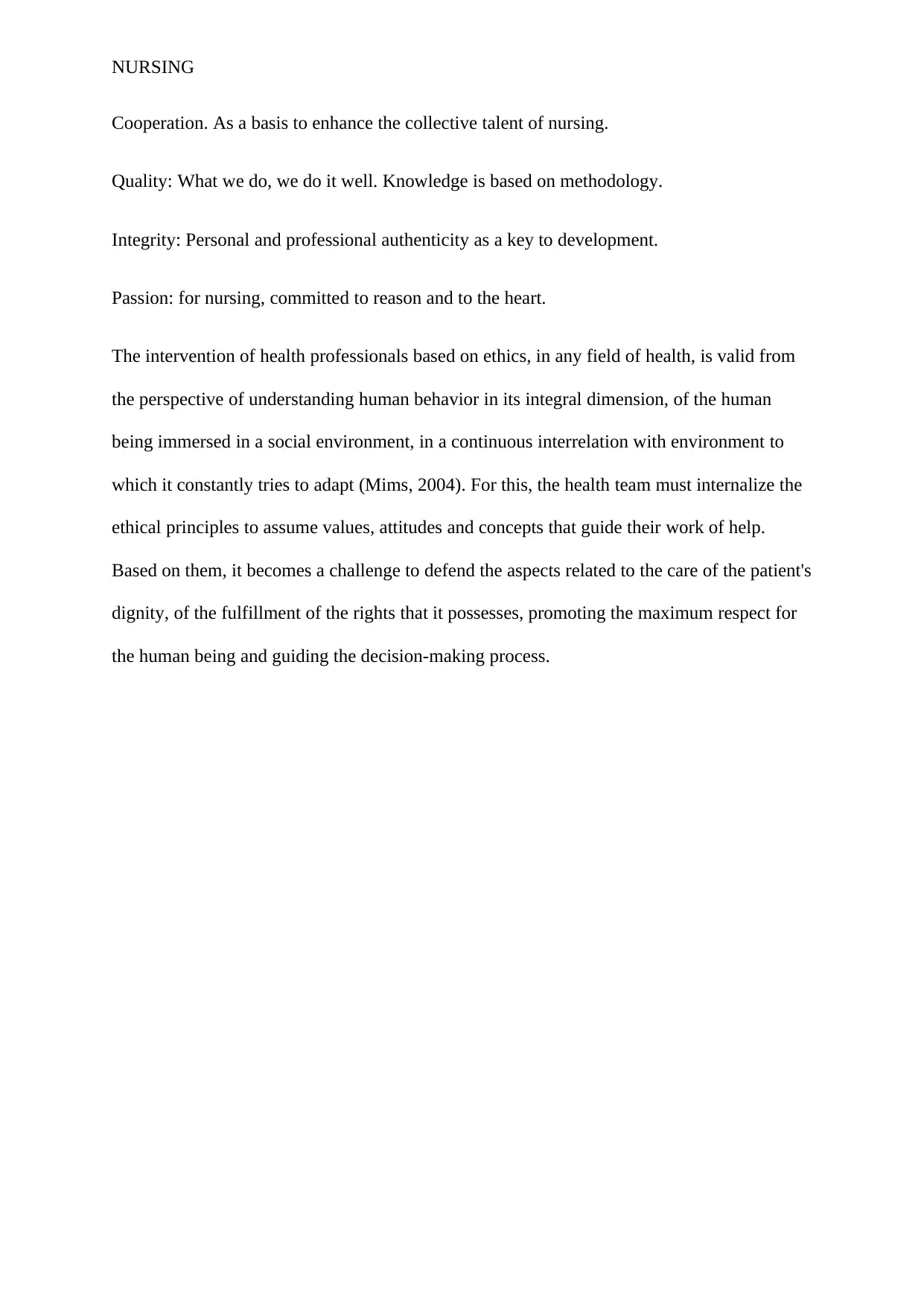
NURSING
Cooperation. As a basis to enhance the collective talent of nursing.
Quality: What we do, we do it well. Knowledge is based on methodology.
Integrity: Personal and professional authenticity as a key to development.
Passion: for nursing, committed to reason and to the heart.
The intervention of health professionals based on ethics, in any field of health, is valid from
the perspective of understanding human behavior in its integral dimension, of the human
being immersed in a social environment, in a continuous interrelation with environment to
which it constantly tries to adapt (Mims, 2004). For this, the health team must internalize the
ethical principles to assume values, attitudes and concepts that guide their work of help.
Based on them, it becomes a challenge to defend the aspects related to the care of the patient's
dignity, of the fulfillment of the rights that it possesses, promoting the maximum respect for
the human being and guiding the decision-making process.
Cooperation. As a basis to enhance the collective talent of nursing.
Quality: What we do, we do it well. Knowledge is based on methodology.
Integrity: Personal and professional authenticity as a key to development.
Passion: for nursing, committed to reason and to the heart.
The intervention of health professionals based on ethics, in any field of health, is valid from
the perspective of understanding human behavior in its integral dimension, of the human
being immersed in a social environment, in a continuous interrelation with environment to
which it constantly tries to adapt (Mims, 2004). For this, the health team must internalize the
ethical principles to assume values, attitudes and concepts that guide their work of help.
Based on them, it becomes a challenge to defend the aspects related to the care of the patient's
dignity, of the fulfillment of the rights that it possesses, promoting the maximum respect for
the human being and guiding the decision-making process.
⊘ This is a preview!⊘
Do you want full access?
Subscribe today to unlock all pages.

Trusted by 1+ million students worldwide
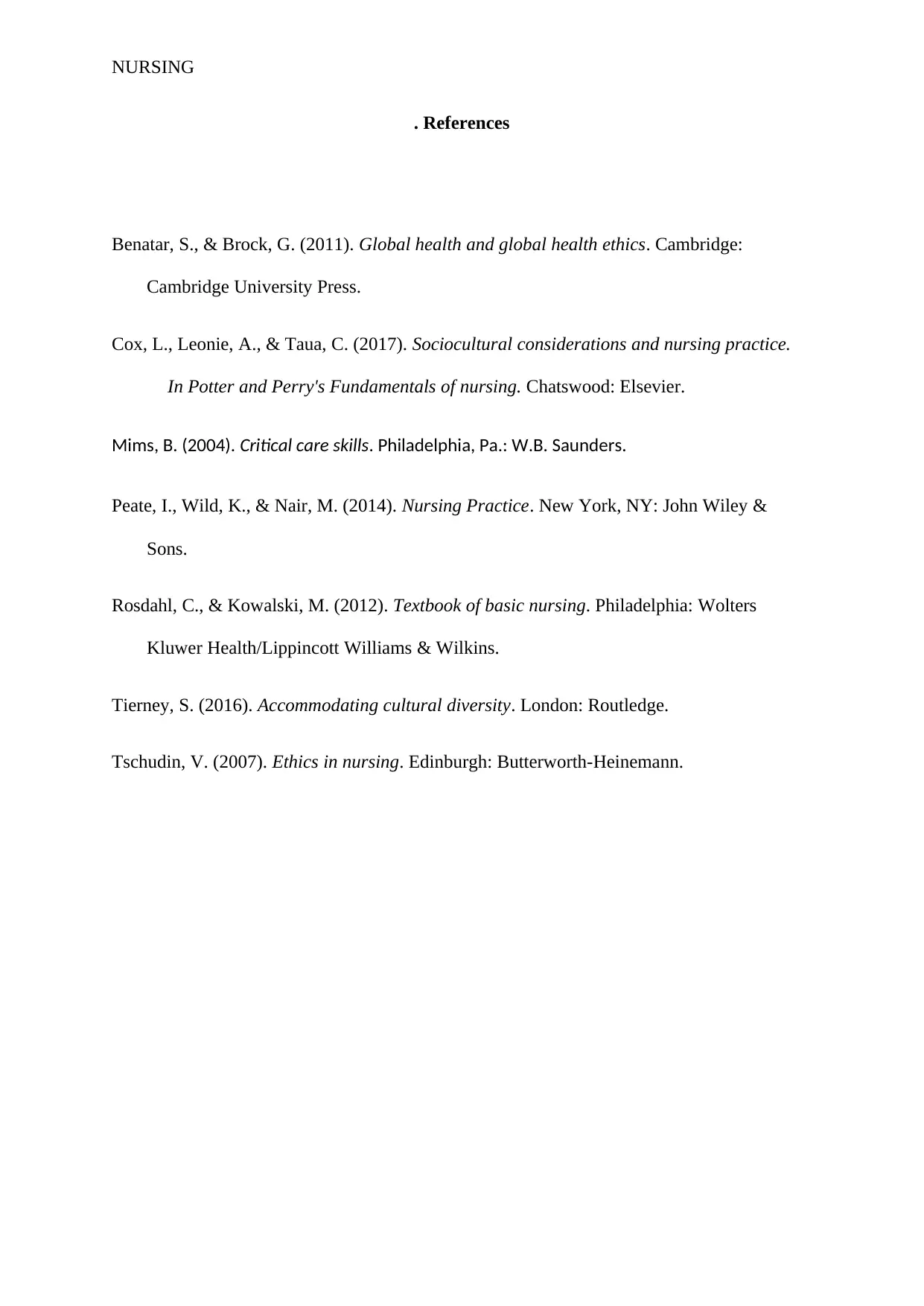
NURSING
. References
Benatar, S., & Brock, G. (2011). Global health and global health ethics. Cambridge:
Cambridge University Press.
Cox, L., Leonie, A., & Taua, C. (2017). Sociocultural considerations and nursing practice.
In Potter and Perry's Fundamentals of nursing. Chatswood: Elsevier.
Mims, B. (2004). Critical care skills. Philadelphia, Pa.: W.B. Saunders.
Peate, I., Wild, K., & Nair, M. (2014). Nursing Practice. New York, NY: John Wiley &
Sons.
Rosdahl, C., & Kowalski, M. (2012). Textbook of basic nursing. Philadelphia: Wolters
Kluwer Health/Lippincott Williams & Wilkins.
Tierney, S. (2016). Accommodating cultural diversity. London: Routledge.
Tschudin, V. (2007). Ethics in nursing. Edinburgh: Butterworth-Heinemann.
. References
Benatar, S., & Brock, G. (2011). Global health and global health ethics. Cambridge:
Cambridge University Press.
Cox, L., Leonie, A., & Taua, C. (2017). Sociocultural considerations and nursing practice.
In Potter and Perry's Fundamentals of nursing. Chatswood: Elsevier.
Mims, B. (2004). Critical care skills. Philadelphia, Pa.: W.B. Saunders.
Peate, I., Wild, K., & Nair, M. (2014). Nursing Practice. New York, NY: John Wiley &
Sons.
Rosdahl, C., & Kowalski, M. (2012). Textbook of basic nursing. Philadelphia: Wolters
Kluwer Health/Lippincott Williams & Wilkins.
Tierney, S. (2016). Accommodating cultural diversity. London: Routledge.
Tschudin, V. (2007). Ethics in nursing. Edinburgh: Butterworth-Heinemann.
1 out of 7
Related Documents
Your All-in-One AI-Powered Toolkit for Academic Success.
+13062052269
info@desklib.com
Available 24*7 on WhatsApp / Email
![[object Object]](/_next/static/media/star-bottom.7253800d.svg)
Unlock your academic potential
Copyright © 2020–2025 A2Z Services. All Rights Reserved. Developed and managed by ZUCOL.





